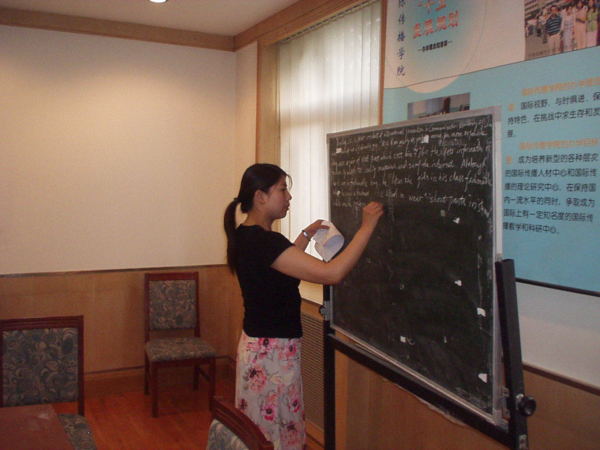 
 字體:小 中 大
字體:小 中 大 |
|
|
|
| 2014/10/13 08:04:38瀏覽3135|回應24|推薦146 | |
臺灣人將自己與大陸人對比,稱自己更健康、更富有,也更有禮貌。若有外國人說臺灣亦有缺陷,比如交通危險或環境退化,就有可能招來所謂大陸相關狀況更糟糕的反駁。鑒於兩岸民眾均以漢族人為主,而且自從臺灣在上世紀40年代“自治”以來,更大更強的大陸就對其宣稱主權,雙方存在一種天然的對壘狀態 (注1)。 但普遍而言,大陸正在迅速變化,而30年後重回臺灣的人竟然會說,他們仍能認出某個街區的每一家商店。就在大陸逐漸“侵蝕”如同對岸生命線的代 工合同時,臺灣卻拒絕變化,使自身經濟幾無新的發展方向。(大陸給臺灣的)顯而易見的經驗是:試著在公寓和道路之間增加一些庭院、人行道的空間。這些在大 陸城市常見的措施將有助於降低臺灣城市的密度,並增加呼吸空間(盡管大陸的空氣也很汙濁)。 但歸根結底,最難以令人接受的經驗——這也是臺灣人抱怨缺乏方向的答案——非雄心莫屬。 本月,一名50歲的臺灣電腦經銷商告訴我,他準備關閉在上海的銷售辦事處。與當初他剛來上海不同,如今的大陸人完全掌握他銷售的科技和打造客戶 基礎所需的禮節。“我來自臺灣”這句話不再有“讓人激動的”價值。他不知道回到臺灣後能做什麽。“我是被淘汰的人之一”,這名叫做傑夫•吳的前銷售人員 說,“對任何與銷售有關的工作而言,我們都沒用了。” 與他交談後不久,我遇到一名從北京來臺北的朋友。她抱怨說,在北京,人們為得到更高薪酬、更大房子和作為身份象征的汽車,都在別人背後“捅刀子”。“向上爬”的詭計暴露出大陸人過多的野心。但“這顆心”至少在砰砰跳動。 如今,臺灣的大學生傾向於安穩的白領工作而非創業。家長也鼓勵小孩找安穩的工作,以防孩子從事打漁、務農或其他在臺灣現代化之前非常普遍的艱苦工作。 正如臺灣人所言,變化應從早期教育做起。不過,臺灣的小學仍強調死記硬背,學生們對用麥克風講上幾小時卻不開展課堂討論的教師惟命是 從。對大陸學校,我也聽到過類似說法。但我10年前在北京某主流大學教寫作,許多學生就勇於在課堂上發言。我在臺北教新聞專業近兩年,但必須懇求甚至威脅 學生參與討論。 我的北京學生畢業後將在大陸頂尖媒體工作一兩年,或攻讀工商管理碩士學位。許多學生到海外攻讀更高學位,在面臨簽證限制的情況下,這並非易事。但是,迫切了解這個世界的雄心使大陸人深諳國際事務並廣交朋友,以在中國境外打造品牌或探索許多市場的消費者需求。否則他們就會陷入困境,像許多頂尖臺灣企業那樣依賴那些過時的生意經——“給我點代工合同就行啦。” One Lesson Taiwan Can Learn From China Taiwanese comparing themselves to people in China argue they’re healthier, wealthier, more polite and better off as a democracy than a Communist state. A foreigner who points out something amiss in Taiwan, perhaps traffic danger or environmental degradation, risks the rebuke that things are worse in China. The two sides have a natural rivalry because both are predominantly ethnic Chinese with the much larger, more powerful China claiming sovereignty over Taiwan since the island became self-ruled in the 1940s. China also tries to curb Taiwan’s foreign relations and, occasionally, economic growth But China normally changes fast while in Taiwan you meet people who return after 30 years saying they recognize every shop on a given block. Taiwan could stand a few changes as China chews into its lifeblood high-tech contracting, leaving the island economy with little new direction. There are short lessons: Try adding yards, sidewalks and setbacks between flats and roads. Those measures common in China’s cities would ease urban density in Taiwan and increase breathing space (even if China’s air is filthy). Taiwan might also follow China’s lead in stoking pride in traditional culture, for example brewing pots of loose leaf tea in public teahouses instead of writing it off as an “old people’s” drink just for home consumption. But the toughest lesson — an answer to the growing grumble among Taiwanese about lacking direction – comes down to ambition. I talked this month to a 50-year-old Taiwanese computer vendor in China who was ready to pack up his Shanghai sales office after 12 years. Unlike when he started, the mainland Chinese understand now the technology he sells and the courtesies required to build a customer base. There’s no more gee-whiz value in saying, “I’m from Taiwan.” He doesn’t know what to do after returning home. “I’m part of a group of people who have been eliminated,” says the ex-salesman, Jeff Wu. “We are not useful for any kind of work involving sales.” Shortly after I talked to him I met a friend from Beijing on a visit to Taipei. In Beijing people are watching their backs while stabbing others to get higher salaries, bigger apartments and status-symbol cars, she griped. The tricks people use to get ahead and a sense that authorities won’t protect their victims expose the excesses of ambition. But at least ambition is pulsating in China. It will take an ethos of ambition to get ahead as people such as Jeff Pu fall behind. But today Taiwan’s college graduates prefer safe white-collar jobs to starting their own firms, keeping wages low because of that labor glut and limiting “innovation” to lexicons of cheerleading politicians. Parents encourage the search for safe jobs to ensure their children don’t risk the hardships of fishing, farming or other tough labor common in pre-modern Taiwan. Change should start from early education, you hear Taiwanese say. Elementary schools focus now on rote learning and following the authority of a teacher who talks through a microphone for hours with no class discussion. I’ve heard the same about schools in China. But when I taught writing at a mainstream university in Beijing 10 years ago, students experimented freely with new storytelling devices and a lot didn’t mind talking in class. I’ve taught a weekly university journalism class in Taipei for almost two years and must beg or threaten local students to participate. The brightest find ways to skip as many lessons as possible and still pass the class. My students from Beijing would turn up a year or two after graduation in the country’s top media jobs, watching or stabbing backs as needed to build careers. Or they might be getting an MBA with an import-export business brewing in the background. A lot went overseas for advanced degrees or professional jobs, not easy given visa restrictions. Rack it up to ambition.
(北京的學生在課堂上演板 Beijing student expresses herself at classroom blackboard) Some left China for the money or the degree. Others went to study a new country, using personal experience to replace the pro-Communist fairy tale version of the world taken from Chinese textbooks or local media such as the inflammatory Global Times. (Every Taiwan media outlet is intensely local.) Ambition to know the world allows Chinese to make sense, and friends, at international events, to brand companies beyond China and know what consumers want in a list of markets. Otherwise they would be stuck, like a lot of the best Taiwanese firms, relying on outdated business formulas such as “just give me a few good OEM contracts.” A few Chinese may return with the drive to make China healthier, wealthier and better governed. “People desire to live abroad to experience other countries, gain new experiences, gain degrees, live in better environments,” notes Scott Kronick, Beijing-based author of The Lighter Side of China (注2).
註1:第一段譯文與原文稍有出入。
|
|
| ( 休閒生活|雜記 ) |










